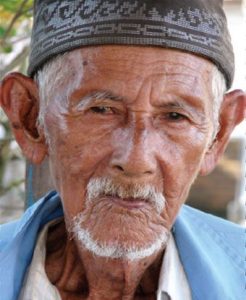 The two million Deli and Asahan Malay live along the eastern coast of North Sumatra. Deli villages are clustered along the coast, and often include not only Deli Malay people, but also people of other ethnic backgrounds such as Javanese and Minangkabau. They live on the banks of rivers and near the ocean in marshy areas that often flood.
The two million Deli and Asahan Malay live along the eastern coast of North Sumatra. Deli villages are clustered along the coast, and often include not only Deli Malay people, but also people of other ethnic backgrounds such as Javanese and Minangkabau. They live on the banks of rivers and near the ocean in marshy areas that often flood.
What Are Their Lives Like?
The Deli typically work as fishermen or traditional farmers. The fishermen work in the Straits of Malacca between Sumatra and Malaysia. Deli fishermen go to sea daily in wooden fishing boats. In urban areas, many Deli Malay work as laborers, while those living near arable land may farm small plots of rice, fruit or vegetables. Fishing conditions also vary seasonally. Employment among the Deli Malay is erratic. Unemployment is especially high among young, unmarried men.
Most Deli houses are raised off the ground on stilts. The Deli Malay live in close-knit communities, with extended families often living in the same house or in close proximity. Deli Malay families are often large, with 5 or 6 children. Electricity is generally available, but access to clean water is still lacking. The rivers are often used not only for bathing and washing clothes but also for defecation. The Deli believe that men and women have equal status in the family. According to the Deli, this agrees with the teachings of Islam; hence, both sons and daughters are able to receive a share of the inheritance from their parents.
What Are Their Beliefs?
Most Deli Malay follow Sufi Islam. It’s often said that once you become Malay, you become Muslim. Despite their strong identification with their religion, the Deli also hold equally strong animistic beliefs about spirits. They have many traditional ceremonies that focus on seeking protection from spirits through magic by either appeasing or controlling these spirits. There are over 100 believers, and a few small house fellowships are meeting.
What Are Their Needs?
Due to poor sanitation, the Deli often suffer from skin ailments and mosquito-borne illnesses. Many Deli also suffer from cataracts caused by the glare of the sun off the water. Also, due to environmental degradation and non-sustainable fishing methods, independent fishermen have begun to struggle.
Leave a Reply